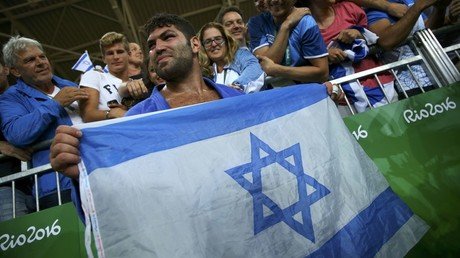Flying the flag: Will gymnastics worlds in Qatar set precedent for Israel at Arab sport events?
The tradition of banning Israeli flags at sports events in Arab countries might be over soon, after World Artistic Gymnastics Championships hosts Qatar promised to allow Israeli national symbols.
All Israeli participants of both men’s and women’s squads are expected to compete in uniform with national emblems during the 10-day tournament which kicks off on Thursday in Doha.
The Israeli flag is also expected to be raised at the Aspire Dome in the event of Israeli athletes’ success at the major gymnastics start of the year.
Members of the Israeli gymnastics team were seen wearing uniform with the national flag during podium training in Doha, confirming Qatar’s assurance to allow Israeli emblems at the tournament.
Qatar, the first Middle-East country to host the artistic gymnastics worlds, is also set to become the first Arab state to officially recognize Israeli participants.
Previously, Israeli athletes performing at the events in Arab states were obliged to compete under a neutral flag due to complicated political relations between the countries.
Israel’s participation at Arab sports events has always been a controversial issue as the vast majority of Arab countries don’t recognize Israel as a state.
In July, the International Judo Federation (IJF) suspended two events which were scheduled to take place in the United Arab Emirates (UAE) and Tunisia due to the countries’ failure to guarantee equal treatment to Israeli competitors.
READ MORE: Judo Federation suspends competitions in UAE & Tunisia over stance on Israel
Last year, the Israeli flag and anthem were banned at the Abu Dhabi Judo Grand Slam after an Israeli competitor, Tal Flicker, won gold in his respective weight category.
At the same event, UAE judoka Rashad Almashjari refused to shake the hand of Israel’s Tohar Butbul during their match, after which UAE officials apologized.
At the Rio 2016 Olympics, a judoka from Egypt, Islam El Shehaby, was sent home from the games after he refused to shake his Israeli opponent’s hand following their match, prompting the Egyptian Olympic Committee to strongly condemn his actions.















